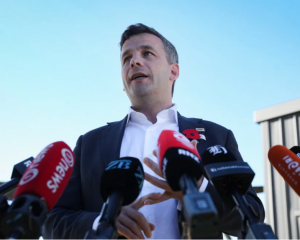
The project is still in its early stages, with the NZ Transport Agency and Ministry of Transport scoping a study to see whether low-speed autonomous shuttles are feasible in New Zealand.
Mr Drury has met Transport Minister Phil Twyford, the transport agency chairman and officials to discuss his idea.
Each vehicle would carry passengers and cargo between the airport and the city along a designated corridor that only needs to be 1.4m wide, about the width of a bike lane, or 3.4m for two-way traffic.
Mr Drury said when Covid struck it got him thinking about infrastructure projects that could help the country back up and running.
‘‘I just sort of reached out, did the work, showed it to Queenstown Council and got them involved.’’
Mr Drury said it was a much cheaper than light rail and other capital-intensive public transport options.
‘‘Essentially you’re [just] painting lines on the road.
‘‘And what’s different about having a dedicated lane is you don’t have to have all the technology which you would have with an autonomous taxi where it’s interacting with normal cars and. . . normal road users.’’
The Queenstown Lakes District Council said the study would give a preliminary view on the viability of driverless public transport, and more work would be needed before rolling it out.
Queenstown Mayor Jim Boult said it was ‘‘certainly on our agenda. And look if you’re going to do it, what a great place to do it. You know, the coolest part of the world, let’s have the coolest public transport system.’’
Mr Drury and Wellington Mayor Andy Foster have also had general, high-level discussions about it.
Transport Ministry strategic policy and innovation manager Richard Cross said in a statement, one of the objectives of the study was to provide councils with good information to help them decide whether to invest in driverless technology.
‘‘The study will use Queenstown as a real-world case study, to ensure that the results are meaningful and to identify issues that may need to be resolved if autonomous shuttles were to be deployed in New Zealand.
‘‘The study will also consider where the technology could be deployed across New Zealand, in order for the results to be applied more broadly, and to provide the best possible assessment for getting the benefits from such technologies.’’
Mr Cross said laws, rules and regulations would also need to be looked at, with the study to be put out to tender in mid-November.













